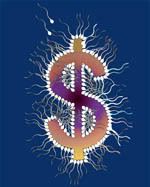US women join class-action lawsuit demanding more money for eggs
Thousands of women across the United States have joined a class-action suit demanding better compensation for egg donors. The case was lodged this week in San Francisco by two firms, Finkelstein Thompson and Cafferty Faucher. It claims that the American Society for Reproductive Medicine, the Society for Assisted Reproductive Technology and the San Francisco-based Pacific Fertility Center engaged in anti-competitive behaviour to fix the price paid to egg donors.
 Thousands of women across the United States
Thousands of women across the United States
have joined a class-action suit demanding better compensation for egg donors. The
case was lodged this week in San Francisco by two firms, Finkelstein
Thompson and Cafferty Faucher. It claims that the American Society for
Reproductive Medicine, the Society for Assisted Reproductive Technology and the
San Francisco-based Pacific Fertility Center engaged in anti-competitive
behaviour to fix the price paid to egg donors.
The Federal or state governments do not
regulate egg or sperm donation, except in Louisiana and Indiana. However, non-binding
guidelines set by the American Society of Reproductive Medicine for fertility
clinics stipulate that egg donors should normally be paid no more than $5,000
and that compensation over $10,000 is “inappropriate”.
A quick browse on the web indicates that
males can receive between US$65 and $100 per donation. At a company called California Cryobank
sperm donors are reimbursed up to $100
per donation and up to $1200 a month if they donate 3 times a
week. It offers incentives such as movie
tickets or gift
certificates as well. The process of donation is more onerous
for women, of course, but their compensation varies wildly. Despite the
industry guidelines, egg brokers offer as much as $50,000 to donors from Ivy
League universities.
The law firms contend that the hourly rate
for women is far lower than for men, especially in view of the greater danger
and inconvenience that they endure.
While this inequity seems plausible, there
is a case for arguing that men are underpaid. Sociologist Rene Almeling argued
in the American
Sociological Review in 2007 that “Men donors are paid less for a much
longer time commitment and a great deal of personal inconvenience,” she said.
“They also are much less prepared for the
emotional consequences of serving as a donor of reproductive material. Women,
meanwhile, are not only paid more for a much shorter time commitment, they are
repeatedly thanked for ‘giving the gift of life.’ From compensation rates to
the smallest details of donor relations, sperm donors are less valued than egg
donors,” Almeling said. “Egg donors are treated like gold, while sperm donors
are perceived as a dime a dozen.”
Michael Cook
commercialization
egg donation
sperm donation
- How long can you put off seeing the doctor because of lockdowns? - December 3, 2021
- House of Lords debates assisted suicide—again - October 28, 2021
- Spanish government tries to restrict conscientious objection - October 28, 2021
